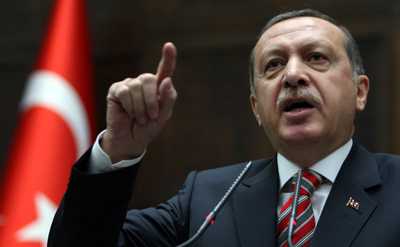Conflating critics with terrorists in Turkey
By Joel Simon and Bill Sweeney/CPJ Staff

Erdoğan speaks at a meeting in parliament on Wednesday. (AFP/Adem Altan)
The government of Prime Minister Recep Tayyip Erdoğan is quick to brand critics as “terrorists,” and that’s one of the main reasons that Turkey was the world’s worst jailer of the press when CPJ conducted its recent census of imprisoned journalists. This week, the prime minister and two pro-government newspapers applied the label once again to critics, illustrating the extremely difficult climate confronting any Turkish journalist who challenges official positions.
Speaking at a parliamentary meeting on Wednesday, Erdoğan lashed out at commentators who criticize the policies of the Justice and Development Party, or AKP. “These types who are named columnists do not know their places when they criticize on TV, saying the AKP administration is behind the world in terms of democratization,” he said. “They say the EU is very much progressed. Progressed in what? We know how they shelter terrorists.” In October, the European Commission published a progress report on Turkey’s reform agenda that was critical of its press freedom record, among other things. Although EU membership remains on Ankara’s agenda, accession has moved in fits and starts due in part to concerns about Turkey’s press freedom and judicial record.
Erdoğan’s comments came two days after two pro-government newspapers, Star and Yeni Akit, ran very similar stories that freely used the word “terrorist” in describing critics. The papers targeted our colleagues at Reporters Without Borders (RSF), which also concluded that Turkey is the world’s worst jailer of the press. Star accused RSF of “providing support to the members of the terrorist organization MLKP,” referring to the banned Marxist Leninist Communist Party. In particular, the papers said RSF was paying Necati Abay, longtime spokesman for the Platform of Solidarity with Arrested Journalists, a group that has tried to bring the plight of imprisoned Turkish journalists to light.
Abay, who now lives in exile in Germany, has faced numerous criminal prosecutions over the years based on the unpopular political views he has expressed as a journalist. Abay said this week that while he is a member of RSF–just like thousands of journalists all over the world–he has never received financial support from the group. He also reiterated that he has no ties to the MLKP.
Star also questioned the Committee to Protect Journalists. “It was confirmed that the lobby of outlaw terrorist organizations was at the basis of the harsh criticisms of the International Committee to Protect Journalists (CPJ) and the Reporters Without Borders (RSF) against Turkey,” the paper said. Stories in both papers closely echoed arguments made in recent government memos that have tried to rebut independent research on imprisoned journalists.
The effect of these comments and reports is to conflate critics with terrorists. When the government and its allies link the EU or RSF or CPJ with terrorism, they are essentially making the same case that state prosecutors make regularly against journalists in Turkey. In indictment after indictment reviewed by CPJ, prosecutors have said that journalists who express dissenting political views are being directed by terrorist groups. Thus, the government reasons, they are themselves terrorists.
These kinds of attacks do nothing to change international public opinion, which is united in the view that Turkey is the world’s worst jailer of the press. In fact, they reinforce the perception that an intolerant government deliberately conflates critical expression with terrorism in order to intimidate its perceived opponents.
UPDATE: RSF has put out a statement rebutting the allegations and calling them “grave, disgraceful, and absurd.” Click here to read the press release.
Joel Simon is the executive director of the Committee to Protect Journalists. He has written widely on media issues, contributing to Slate, Columbia Journalism Review, The New York Review of Books, World Policy Journal, Asahi Shimbun, and The Times of India. He has led numerous international missions to advance press freedom. Follow him on Twitter @Joelcpj.
via Conflating critics with terrorists in Turkey – Blog – Committee to Protect Journalists.